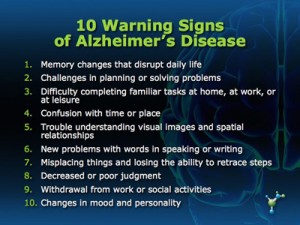5 BRAIN PRESERVING TIPS TO PREVENT ALZHEIMER’S DISEASE
Alzheimer’s national awareness is upon us. This is a disease that continues to be on the rise and hit’s close to home for me. Almost every person you speak to has in some way been touched by this disease.
Alzheimer’s and related dementias affect approximately 5.3 million Americans. One out of eight older adults has Alzheimer’s disease — the sixth leading cause of death in the United States.
Despite the bad news, we are now learning some very encouraging things about actually preventing Alzheimer’s disease. While for years we’ve been hearing about a “heart-smart diet” or eating foods to “reduce the risk of diabetes,” what’s so exciting is that specific lifestyle choices can have a dramatic effect in terms of actually reducing Alzheimer’s risk.
Alzheimer’s disease, like coronary artery disease, arthritis and even cancer, is triggered by inflammation. While most of us can easily recognize the role of inflammation in a painful arthritic joint, it is the exact same process that has now been identified as playing a pivotal role in Alzheimer’s disease. In fact, the same laboratory markers used by doctors to measure the degree of inflammation in the body in an attempt to determine cardiac risk are just as effective in predicting risk for Alzheimer’s disease.
Basically if you can reduce overall inflammation in the body it works beautifully to decrease your risk of Alzheimer’s disease
Here are the top five brain-preserving recommendations:
- Reduce foods that raise blood sugar. Higher blood sugar increases inflammation. Avoid refined grains, and reduce grain consumption in general. Eat more vegetables than fruit, and favor vegetables that are grown “above ground.” If it will not rot or sprout throw it out.
- Eat healthier fats. Studies clearly show that higher levels of good fats like virgin olive oil, grapeseed oil, coconut oil, avocado, raw nuts and seeds, wild fish, and even grass-fed beef, are brain protective. It’s the bad fats, meaning those fats that have been modified or hydrogenated, as well as trans fats, that are clearly bad for the brain.
- Exercise. Research demonstrates a marked reduction in Alzheimer’s risk among those who regularly exercise aerobically. 20 minutes of aerobic exercise 6 or 7 days each week. In fact, new research actually shows increased growth of the brain’s “memory center” in people who exercise regularly.
- Sleep at least 8 hours each night. Inadequate sleep is strongly associated with Alzheimer’s risk.
- Take an omega-3 supplement containing DHA. According to the well-respected Framingham Study, individuals consuming the highest levels of DHA, a powerful natural anti-inflammatory, may have as much as a 40% risk reduction for Alzheimer’s disease. Make sure you purchase a high grade fish oil that is GMP certified and 3rd party tested every batch. Cheap fish oil can be more toxic and do more damage.
You do have the control to change your destiny if this horrific disease runs in your family make sure you give your body the right environment and prevent inflammation and feed the brain the nutrients it needs.
sources:
Pennsylvania Behavioral Health and Aging Coalition.Brain Health: Cognitive Changes in Older Adults. Accessed December 26, 2014.
David Perlmutter, MD, FACN, ABIHM Board-certified neurologist and Fellow of the American College of Nutrition Practitioner of Functional Medicine







